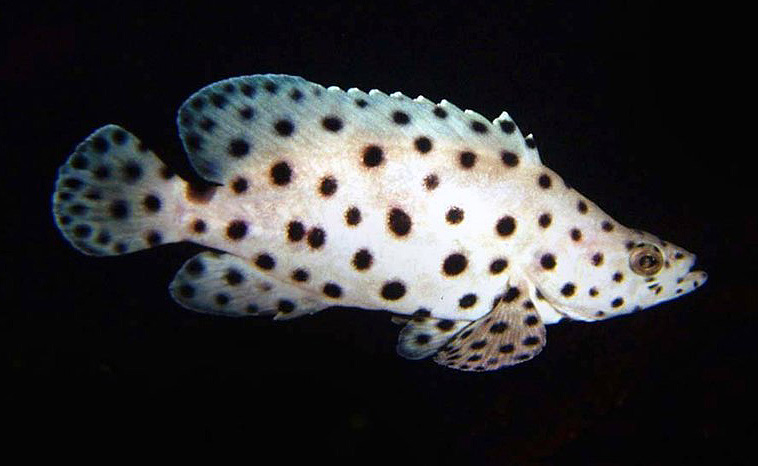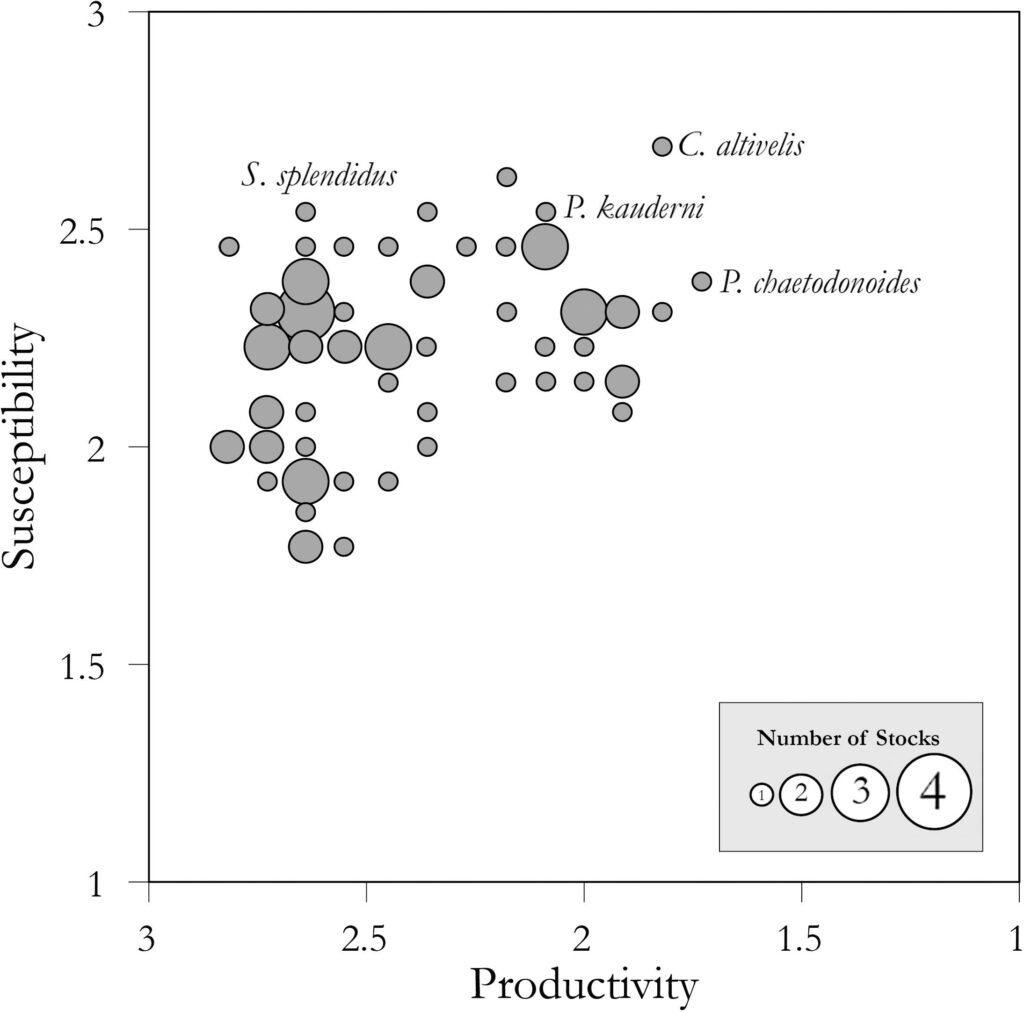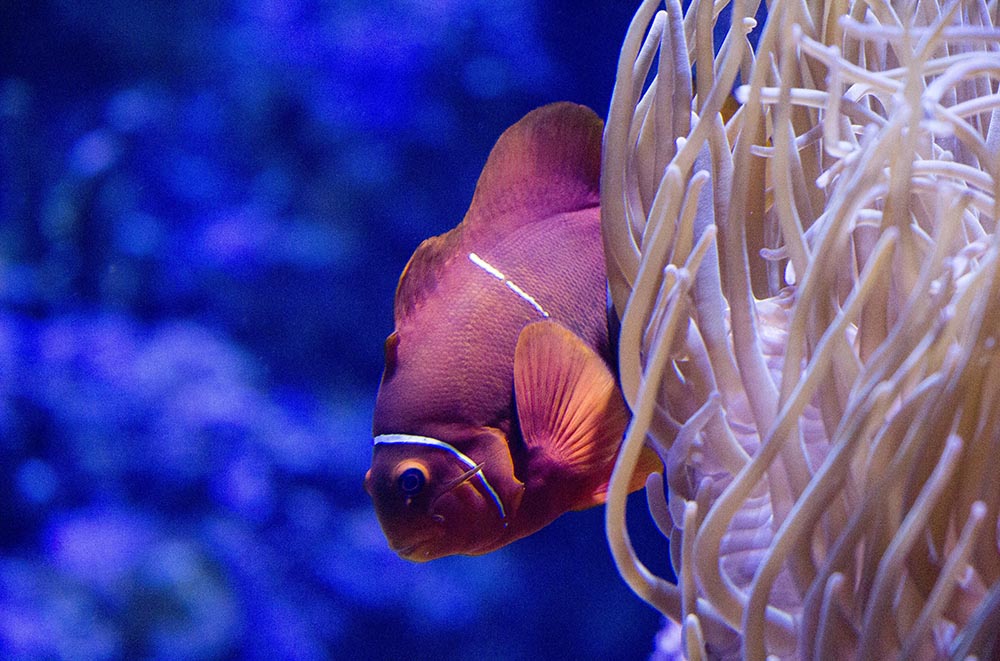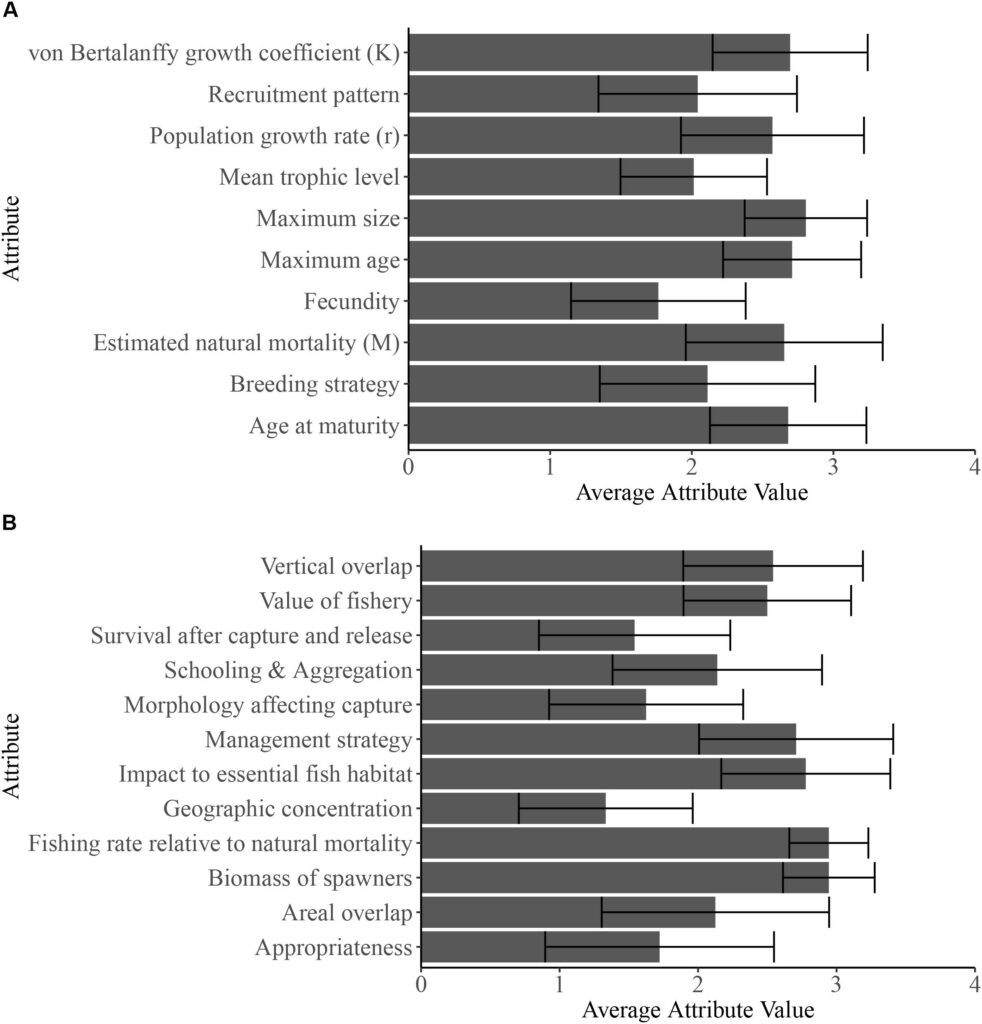
The Panther Grouper, Cromileptes altivelis, one of the five species identified as most at risk of overcollection, according to a newly-published study.
via MASNA
MASNA’s Q2 2018 Open Access Memorial Fund Article now freely available to the public
MASNA is proud to announce that the Quarter 2 2018 publication, funded by the Dr. Junda Lin Memorial Fund for Publishing Open Access Marine Aquarium Research, is now freely available to the public as an open access article.
Our Q2 recipient is Dr. Laura Dee, an assistant professor of conservation science based out of the Department of Fisheries, Wildlife, and Conservation Biology at the University of Minnesota in St. Paul, Minnesota. Laura is the primary author of the paper entitled “Assessing Vulnerability of Fish in the U.S. Marine Aquarium Trade,” which was published by Frontiers in Marine Science in January of 2019.
In her original research article, Dr. Dee identifies several commonly imported species of marine ornamentals that are vulnerable to overfishing by using attributes related to reproductive productivity, success in home aquaria, ease of wild capture, and natural mortality rates. Ultimately, her findings inform potential avenues in aquaculture research, which can be used to guide monitoring efforts for collections and exports and potentially aid in identifying management interventions for species at highest risk of overcollection. Laura summarizes the importance of this research here:
“Fisheries support the livelihood of millions of people worldwide. However, many of these fisheries lack the data, resources, and expertise needed to perform assessments that ensure proper management of the target species. Additionally, species are subject to a variety of threats including climate change, pollution, and overfishing.”

From the paper: Scatterplot of productivity versus susceptibility scores for 72 coral reef fish stocks, as estimated by PSA. Circle size corresponds to the number of stocks at that position on the graph (see inset legend). Scientific names of the stocks highlighted in the text are noted. Following standard PSA methods from Patrick et al. (2009), the x-axis scale is reversed (from high to low productivity).
The aquarium fish trade encompasses over 1,800 species of coral reef fishes from over 40 exporting countries. These fisheries support livelihoods, provide benefits to hobbyists, and contribute to education efforts about coral reefs. Like many other fisheries, data for the aquarium trade is lacking, limiting the management that exporting countries can do, and valuable species are threatened by over-collection. Dee et al. (2019) assess the vulnerability of 72 popular coral reef fish imported into the United States from the largest exporting countries (by volume), the Philippines and Indonesia. To assess the vulnerability of the selected species, Dee et al. (2019) used a risk assessment method that provides an estimate of relative vulnerability for each species considered.

In the newly-published paper, the Maroon Clownfish, Premnas biaculeatus, is identified as being at risk of over-collection.
The five most vulnerable species were Chromileptes altivelis (Panther Grouper), Plectorhinchus chaetodonoides (Harlequin sweetlips), Pterapogon kauderni (Bangaii Cardinalfish), Premnas biaculeatus (Maroon Clownfish) and Echidna nebulosa (Snowflake Moray Eel). The five least vulnerable species were Halichoeres chrysus (Canary Wrasse), Nemateleotris decora (Elegant Firefish), Chaetodon lunula (Racoon Butterflyfish), Pseudocheilinus hexataenia (Sixline Wrasse), and Gobiodon citrinus (Citron Goby). Factors that influenced species’ vulnerability varied, with some species affected by low fecundity (they could not produce many offspring), and others affected by harmful collection methods (for example, needle-spearfishing).
There are several ways to reduce the vulnerability of the highest-ranking species, including investment in research and aquaculture, monitoring of collection and exports, and fisheries management where the fishes are collected. Additionally, retailers and consumers can consider other species or sources, like aquaculture. Hobbyists and retailers can reference these vulnerability estimates to guide their purchases. Generally, sourcing cultured fish from locations where sustainable collection and management is demonstrated can help reduce the risk of over-collection.

From the paper: averages of each attribute score for the (A) 10 productivity (“P”) and (B) 12 susceptibility (“S”) attributes for the 72 stocks. Error bars represent +/-1 standard deviation. Supplementary Table S1 provides details about the attribute categories, and the Supplementary Information provides criteria and for attribute scoring. Supplementary Table S2 provides the attribute scores for each stock and attribute.
With a changing climate, fishing pressures, and pollution, coral reef fish populations are subject to declines. These changes can spread beyond the reef and impact the people that rely on them for fisheries. This analysis helps prioritize and identify the species in the greatest relative need of investment, research, and monitoring. With it, we are one step closer to assessing and managing the aquarium fish trade, and ensuring the sustainable collection of coral reef species to both protect reef wildlife and the long-term viability of the aquarium trade and hobby.
The article can be found for free here: www.frontiersin.org
Congratulations to Laura and her coauthors!
Scientific research has historically been published and distributed by for-profit companies that require readers to pay to access content, comprising a 19.6-billion-dollar industry that results in inaccessibility for most hobbyists. Research institutions have begun terminating long-standing subscriptions to for-profit journals, and many independent researchers have taken an active stance on information dissemination by opting to publish in open-access formats. MASNA fully supports open-access publishing, and firmly believes that rdesearch relating to aquarium science should be available to anyone who wishes to read it. For more details on recent open-access publishing developments, see HERE.
About the Junda Lin Memorial Fund
In 2017, MASNA introduced the Dr. Junda Lin Memorial Fund for Publishing Open Access Marine Aquarium Research. Its goal is to offset the cost to students of publishing research as open access articles in order to promote the spread of scientific ideas to scientists and anyone who is interested in the research. The Fund works to makes open access articles freely available.

Dr. Junda Lin, whose passion for mentoring marine scientists has inspired a new fund for supporting open-access journal publication of marine-aquarium related research.
Dr. Junda Lin was a Professor of Biological Sciences at the Florida Institute of Technology and the Director of the Institute for Marine Research (IMR). Dr. Lin’s Lab focused on the development of aquaculture technology for marine ornamental species to offset and replace wild collection. Dr. Lin’s lab studied the basic biological processes of several shellfish and fish species, evaluated their aquaculture potential, and developed cultivation technology.
Rather than in the traditional scientific publishing scheme–where the reader of the scientific article incurs a cost to access the article–with open access articles, the article is available to the world, and the author is charged a fee when the article is accepted by the publisher.
The Dr. Junda Lin Memorial Fund for Publishing Open Access Marine Aquarium Research is sponsored by individuals, aquarium clubs, businesses, and universities that provides students with a financial offset to the costs of publishing a scientific article as an open access article. More information on how to apply and donate can be found here: http://masna.org/masna-programs/memorial-publishing-fund/
MASNA would like to thank the donors that have contributed to the Junda Lin Memorial Fund thus far. Open-access publications allow the rapid dissemination of research to the non-scientific public that would otherwise not be able to access this information. The modern marine sciences increasingly recognize the importance of informed hobbyists and citizen scientists in data collection, volunteer work, their ability to drive changes in public outlook and policy.
MASNA welcomes donations from any organization or individual who shares the belief that advancements in science should be freely available to the general public and to those that support MASNA’s mission to encourage the sustainability and ethical growth of the marine aquarium industry through the education of its members and the wider hobbyist community.
For more information and to donate to the fund, please click here: http://masna.org/masna-programs/memorial-publishing-fund/
###





